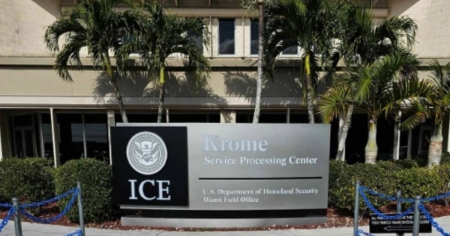The revocation of the humanitarian parole for Cubans, Haitians, Nicaraguans, and Venezuelans has left those unable to regularize their status in the United States with no options and at risk of deportation. A young Cuban, who stated that he has an expulsion order from that country, said that the best option was to cross the border and enter Canada rather than be returned to the Island.
The Cuban identified on TikTok as Xmen Coco shared his wild idea during a live stream he held on that social network, where he documented his alleged departure from Miami airport to a border crossing with Canada to enter that country.
"Right now I'm running to the border to see if I can jump into Canada. I have a deportation order from the United States to Cuba, but I'm not going back to Cuba. The best option so far has been to go to Canada and I’m going to try to get to the border by plane to see if I can make it," he announced in the first moments of the video.
According to their testimony, the idea emerged amid the worsening situation of immigrants being detained by ICE if they do not have legal permission to remain in the U.S.
Although fearful of being asked for identification, the young man allegedly managed to board the plane.
"I'm already inside. As for Cuba, I'm not going back; I'm going to try to cross the Canadian border," he said.
Later, he communicated that it was possible to reach the border with Canada without any issues, as they were only requesting documentation from random individuals. Shortly before boarding, he insisted: "I'm going with the Eskimos, but I won't return to Cuba".
In a later video, the young man shared that he was in Canada, where the cold took him by surprise. As he revealed, he bought a coat from a market to keep warm and began his search for his aunt, the only person he knows in that country.
Everything seems to be a joke from the influencer, as comments on his posts claim that this Cuban has American citizenship and was just joking about the fears many Cubans have of being expelled.
However, the situation could seem real in a context where the U.S. Department of Homeland Security (DHS) began sending an electronic notification to migrants who arrived in the country under humanitarian parole, informing them that they must leave the United States or they will be expelled.
If migrants do not leave the United States before the expiration date of their parole, they will begin to accumulate unlawful presence, which could affect future applications for entry into the country. Additionally, they may be subject to expedited removal proceedings under the Immigration and Nationality Act (INA).
Frequently Asked Questions about the Deportation of Cubans and Humanitarian Parole
What is humanitarian parole and why was it revoked?
The humanitarian parole is a program that allowed migrants from Cuba, Haiti, Nicaragua, and Venezuela to enter the U.S. legally with a temporary permit. It was revoked by the Trump Administration as part of a series of executive orders that tightened immigration policies. This revocation affects thousands of individuals who now face the threat of deportation if they do not regularize their status.
What options do Cubans have in light of the revocation of humanitarian parole?
Cubans with humanitarian parole may choose to seek other legal avenues to stay in the U.S., such as applying for asylum or benefiting from the Cuban Adjustment Act. According to attorney Willy Allen, those who already have ongoing asylum applications, TPS, or other visas would not be at immediate risk of deportation. It is important to seek legal advice to explore all available options.
Is it viable to cross into Canada as an alternative to deportation?
Crossing into Canada can be an option to avoid deportation, though it is not a guaranteed solution and carries its own risks. In the case of Xmen Coco, it was a joke on social media, but it reflects the desperation of some migrants looking for desperate alternatives. Canada has its own immigration policies, and crossing illegally may have legal consequences.
How does the revocation of humanitarian parole affect work permits?
The revocation of humanitarian parole entails the immediate cancellation of work permits for those migrants who relied on this program. This leaves many in a precarious situation, as they will no longer be able to work legally in the U.S., which impacts their ability to sustain themselves and puts them at risk of deportation if they cannot find another legal way to remain in the country.
Filed under:
